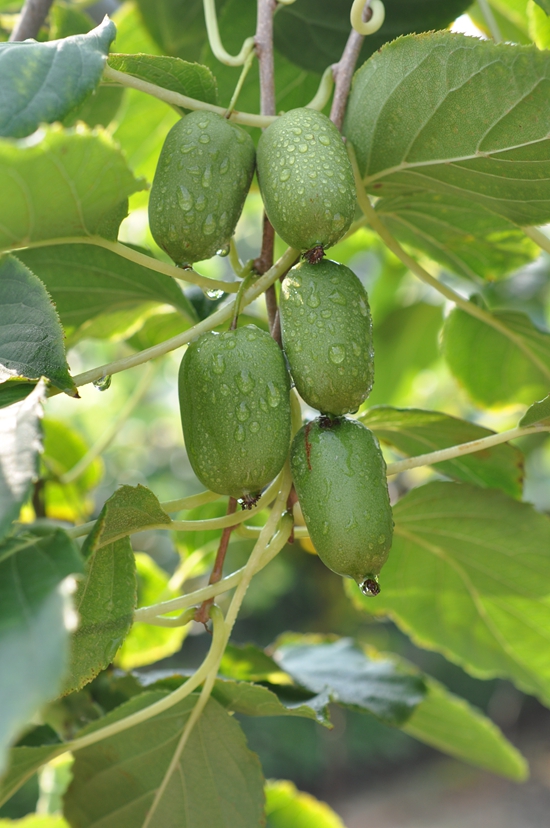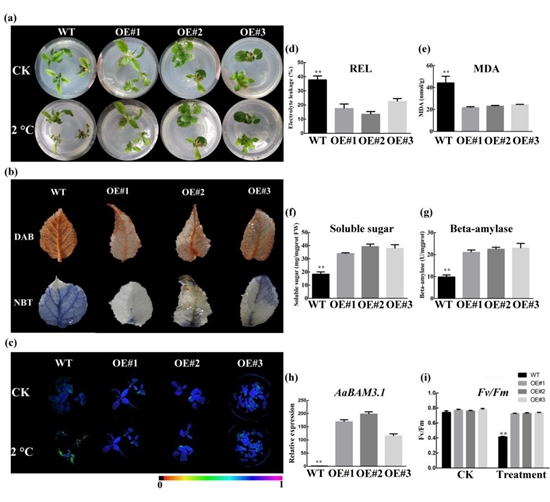The AaCBF4-AaBAM3.1 Module Enhances Freezing Tolerance of Kiwi Fruit (Actinidia arguta)
low temperature stress is a kind of abiotic stress,which can considerably limit both plant growth and yield. For decades, the frequent occurrence of extreme low temperature severely has restricted the development of kiwi fruit industry. Recently, kiwi fruit germplasm and breeding team of Zhengzhou Fruit Research Institute, Chinese Academy of Agricultural Sciences (ZFRICAAS) has made new progress in mechanism of freezing tolerance of kiwi fruit (Actinidia arguta). These findings show that the AaCBF4-AaBAM3.1 module is involved in the transduction network related to the freezing tolerance of kiwi fruit. The related research results were published in the journal of Horticulture Research.
This team previously identified β-amylase gene (BAM) that differentially expressed in kiwi fruit with different freezing tolerance using BSR-Seq method, the function of BAM in freezing tolerance mechanism was investigated in this study. Beta-amylase (BAM) plays an important role in plant resistance to low temperature stress. A low temperature-responsive gene module was involved in the freezing tolerance of kiwi fruit. In this module, the expression of AaBAM3.1 encoding a functional proteinwas induced by low temperature stress. AaBAM3.1-overexpressing kiwi fruit lines showed increased freezing tolerance, and the heterologous overexpression of AaBAM3.1 in Arabidopsis thaliana resulted in a similar phenotype. The results of promoter GUS activity and cis-element analyses predicted AaCBF4 to be an upstream transcription factor that could regulate AaBAM3.1 expression. Further investigation of protein-DNA interactions by using yeast one-hybrid, GUS coexpression, and dual luciferase reporter assays confirmed that AaCBF4 directly regulated AaBAM3.1 expression. In addition, the expression of both AaBAM3.1 and AaCBF4 in kiwi fruit responded positively to low temperature stress. Hence, AaCBF-AaBAM module is involved in the positive regulation of the freezing tolerance of kiwi fruit.
The first author of the paper is Ph.D. student Sun Shihang from ZFRI, and the corresponding authors are Professor Fang Jinbao and associate Professor Lin Miaomiao from ZFRI. The research was supported by the National Science Foundation of China (Grant No. 31801820); the National Key Research and Development Project of China (Grant No. 2019YFD1000800); the Special Engineering Science and Technology Innovation, Chinese Academy of Agricultural Sciences (Grant No. CAAS-ASTIP-2015-ZFRI); and the Modern Agricultural Industrial Technology System of Henan Province (Grant No. S2014-11).
More details are available at the link below:
https://www.nature.com/articles/s41438-021-00530-1

Fig1 Freezing tolerant kiwi fruit species (Actinidia arguta)

Fig. 2 Cold tolerance characterization of A. chinensis harboring the 35 S::AaBAM3.1 construct. a Phenotypes of the overexpression lines (#1,#2, and #3) and WT plants under cold stress (2 °C for 2 h). b Diaminobenzidine (DAB) and nitro blue tetrazolium (NBT) staining of the overexpression lines (#1, #2, and #3) and WT plants under cold stress (2 °C for 2 h). c, i Fv/Fm of kiwi fruit over the course of a 2 h low-temperature treatment. A colored barcode is shown below the images. d–g Relative electrolyte leakage (REL), malondialdehyde (MDA), soluble sugars (SS) and BAM activity levels were measured under cold stress. (h) Expression of AaBAM3 in kiwi fruit under cold stress
By Lin Miaomiao and Sun Shihang (linmiaomiao@caas.cn, 18838294775@163.com)
-
 Apr 18, 2024Opening Ceremony of the Training Workshop on Wheat Head Scab Resistance Breeding and Pest Control in Africa Held in CAAS
Apr 18, 2024Opening Ceremony of the Training Workshop on Wheat Head Scab Resistance Breeding and Pest Control in Africa Held in CAAS -
 Apr 03, 2024IPPCAAS Co-organized the Training Workshop on Management and Application of Biopesticides in Nepal
Apr 03, 2024IPPCAAS Co-organized the Training Workshop on Management and Application of Biopesticides in Nepal -
 Mar 28, 2024Delegation from the School of Agriculture and Food Science of University College Dublin, Ireland Visit to IAS, CAAS
Mar 28, 2024Delegation from the School of Agriculture and Food Science of University College Dublin, Ireland Visit to IAS, CAAS -
 Mar 25, 2024Director of World Food Prize Foundation visited GSCAAS
Mar 25, 2024Director of World Food Prize Foundation visited GSCAAS -
 Mar 20, 2024Institute of Crop Sciences (ICS) and Syngenta Group Global Seeds Advance Collaborative Research in the Seed Industry
Mar 20, 2024Institute of Crop Sciences (ICS) and Syngenta Group Global Seeds Advance Collaborative Research in the Seed Industry
